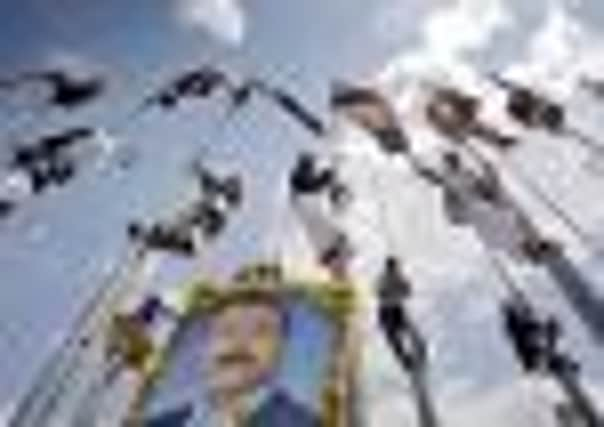Saleh returns months after being hit by palace bomb


He had spent three months in Saudi Arabia undergoing hospital treatment.
On his arrival in the Yemen capital, Sanaa, he called for a ceasefire after five days of fierce fighting.
Advertisement
Hide AdAdvertisement
Hide AdHis reappearance comes amid protests against his 33-year rule, which erupted in January.
America’s State Department immediately said it wanted Mr Saleh to step down, arrange a full transfer of power and allow Yemen to “move on”.
Violence in Sanaa exploded this week, when a stand-off between loyalist troops and forces backing anti-Saleh protesters turned into a full-blown military showdown that killed more than 100 people in five days.
The country, one of the region’s poorest, also faces a worsening insurgency linked to al-Qaeda, an uneasy truce with Shia fighters in the north and separatism in the south.
Moments after state television’s announcement of his return from Saudi Arabia, where he had been recovering from severe burns, the capital’s streets erupted with bursts of gunfire and fireworks.
Mr Saleh, 69, called for a ceasefire so that talks could be held.
“The solution is not in the mouths of rifles and guns, it is in dialogue and stopping bloodshed,” the defence ministry quoted Mr Saleh as saying. But many Yemenis saw his return as an attempt to rally his forces.
His return sharply divided Yemenis, with supporters joyfully predicting he could restore order, and opponents saying they feared his presence would spark civil war.
Advertisement
Hide AdAdvertisement
Hide Ad“I’m so excited,” said Akram al-Aghbari, a doorman. “He is an honourable and great man. I know he’s coming to stop this terrible violence. People here without him only know how to rule with weapons, but with him back, just you watch: he will return the country to what it was.”
Abdulghani al-Iryani, a political analyst and co-founder of the Democratic Awakening Movement, warned strife lay ahead.
He said: “This is an ominous sign. Returning at a time like this probably signals he intends to use violence to resolve this. This is dangerous. His people will feel they are in a stronger position and will refuse to compromise. Basically this means the political process is dead in the water.”
Supporters were ecstatic. Radio stations blasted out celebratory music and thousands gathered at a pro-Saleh rally waving flags, beating drums and blowing horns.
At 70 Square, a hub for pro-government Yemenis, the imam leading prayers said: “The president returned, the heart beat of Yemen returned, happiness returned, love returned, logic returned.”
Many Yemenis thought they had seen the last of Mr Saleh when he flew to Saudi Arabia in June for medical treatment.
He had already been involved in negotiations mediated by neighbouring Gulf states to leave office, repeatedly promising to step down only to change his position at the last minute.
Saadaldeen Talib, a former opposition MP, said: “[His return is] quite awful actually. It makes it more likely the violence will continue. The whole situation will go out of hand… I don’t know where it will end.”